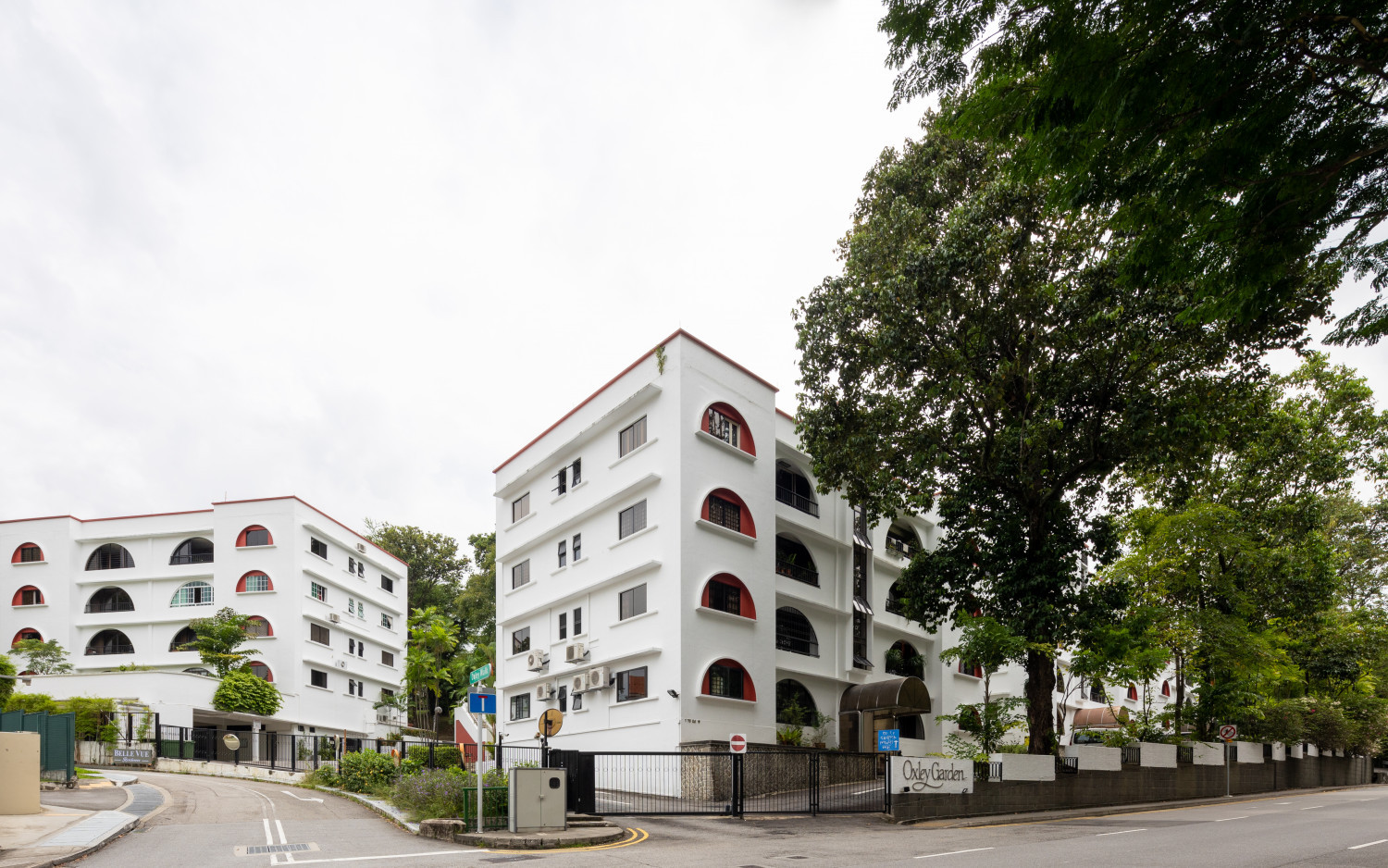UNTIL 10 to 15 years ago, the shophouses on South Bridge Road in the Boat Quay Conservation Area were still occupied by textile merchants, clothing retailers, Chinese provision shops as well as trading companies dealing in the import and export of dried foodstuffs such as oysters, scallops and Chinese mushrooms. These traditional businesses vanished as the Boat Quay neighbourhood was transformed into an entertainment area with restaurants, bars and clubs.
Many of the shophouses along the stretch of South Bridge Road near the junction of North Canal Road were built close to a century ago, and mainly in Early Art Deco style. The names carved on the exterior of these shophouses — for example, Nguang Building (formerly Lai Nguang), Tan Yeow Heng and Fook On Co — are the only hint of its past as an area once dominated by Cantonese merchants.
In recent years, some of these shophouses changed hands, and the new owners gave the properties a new lease of life. One such property is the three-storey shophouse at 81 South Bridge Road, with the name Yoo Yuen & Co Ltd carved in both English and Chinese on the façade. It was once occupied by a textile trading company and then a haberdashery before being left vacant for more than a decade. The current owner — prolific real estate investor, Tony C L Chen, CEO of Arcc Holdings — purchased the property in late 2011.
Chen, a graduate of Cornell University, was born in Hong Kong. He became a Canadian citizen, and moved to Singapore in the 1990s, where he is now a permanent resident. He spent about $2 million on refurbishing and updating the interiors of the three-storey shophouse at 81 South Bridge Road. “The shophouse was in a terrible state when we first bought it,” recounts Chen. “So, we worked with an architect who understood our idea about how we wanted to position the building, and now we have a final product that we are ready to reintroduce on the market to show people how the space can be used.”
Chen engaged Gary Lim, director of Tellus Architects and formerly with Liu & Wo Architects, known for designing many of the Good Class Bungalows in the prime districts. Lim estimated that the entire process, from obtaining planning approval to completion of restoration works, took 12 months.
The efficiency of the floors was maximised with a column-free design and by placing an en-suite bathroom on each level. The highlights of the property are the top floor, where a mezzanine level was added, and an external spiral staircase leading to the roof terrace. The refurbishments were completed two months ago and the property was recently launched on the market for sale. “Having an office in a shophouse is a lifestyle that can’t be replicated in a high-rise commercial building,” says Chen. “We visualise the occupier to be a corporate tenant that will take up the whole building.” The ground-floor space can be used for F&B, retail or as a showroom, and is ideal for a “chill-out bar”, he adds.
His enthusiasm for conservation shophouses was stoked in 2007 when he visited the office of one of his friends, a Frenchman, which was located in a shophouse on Neil Road. While the ground floor of the shophouse, which has a courtyard garden, was used as an office, the upper floors were used as his residence. Chen went to the office around 5.30pm one day and was invited to enjoy a glass of champagne in the courtyard. That was when he saw the potential of investing in such shophouses and rethought its use of space. Prior to that, he had mainly been an active player in the residential and strata commercial space, and was also an operator of service offices.
“I hadn’t appreciated these conservation shophouses until then,” he says. “I realised that, if you can offer someone a glass of wine or champagne in such a setting, it breaks down barriers and makes it easier to do business. That was when I fell in love with shophouses and started to track the transactions and visualise the possibilities of such an office space.”
Since then, Chen has focused exclusively on investing in conservation shophouses. He has accumulated a sizeable portfolio, mainly in the historic Chinatown district. His first investment in a conservation shophouse was two adjoining units on Tras Street near the Tanjong Pagar MRT station. A significant portion of his portfolio can be found in the neighbourhood of Duxton Hill, for which he has also engaged Tellus’ Lim as the architect. Chen targets dilapidated properties in need of refurbishment and enjoys rethinking the use of the space.
For Chen, another attraction of conservation shophouses is the scarcity factor, as there are only 5,600 buildings in Singapore that have been gazetted for conservation by the URA, and the number includes shophouses. “Conservation shophouses are rare; there is only a finite number and no new supply coming up,” says Chen. “Very few come on the market for sale.”
Interest in the shophouse at 81 South Bridge Road has been strong, coming from a good mix of end-users and investors, according to Sammi Lim, associate director of investment properties at CBRE, the appointed marketing agent. The guide price for the shophouse is $13.8 million. The property has a 999-year lease and sits on a land area of 1,316 sq ft, with a total gross floor area (GFA) of 5,656 sq ft. Thus, the price works out to $2,440 psf based on GFA. CBRE’s Lim sees the ground-floor unit commanding rental rates of $13 to $18 psf per month, and believes the upper floors could achieve $6 to $7 psf per month.
It is not just local investors but foreign buying interest has also been strong because the commercial sector has yet to be subject to anti-speculation measures in the form of the additional buyer’s stamp duty (ABSD), seller’s stamp duty (SSD) or a cap on loan-to-value ratios. Even strata industrial buyers who sell within the first three years of purchase are now subject to SSD with effect from Jan 12 For commercial space, there are also no restrictions on foreign ownership.
“Many like the architecture and characteristics of historic shophouses, and the location, especially those within the CBD,” says CBRE’s Lim. In recent years, these shophouses had been used as corporate headquarters by boutique law firms private-equit firms and hedge funds, and they are becoming increasingly popular with architectural firms, creative firms, IT companies and family businesses. “Like Good Class Bungalows, there is a certain intrinsic value in shophouses. Buyers are willing to pay a premium for something they really like, whether it’s the location or the distinctive façade,” she adds.
The most recent transactions on South Bridge Road in the Boat Quay area were those of Nguang Building, a 99-year leasehold, three-storey shophouse that changed hands for $6.5 million in February, and another unit farther up on South Bridge Road, which has a 999-year lease, was sold for $5.5 million in January, according to caveats lodged with URA Realis.
Will prices of conservation shophouses continue to soar?
Investor interest in conservation shophouses has spiked in the past year, especially for those in the CBD, Chinatown and Little India. Average transaction prices have also risen drastically, along with transaction volume. In 4Q2012, there were 43 shophouse transactions in Districts 1 to 8, in the Tanjong Pagar, Telok Ayer, Boat Quay, Bukit Pasoh and Little India conservation areas, based on caveats lodged with URA Realis. Total sales amounted to $240 million, or average of $3,394 psf. In 1Q2013, 45 units were sold, with the value transacted totalling $330 million ($4,347 psf). Thus, average prices in general have jumped 28% q-o-q, says Mary Sai, executive director of investments (commercial) at Knight Frank. Compared with 1Q2012, the jump in average price psf was even more significant, at 41.6%.
“Shophouses are a main draw for investors as (they) are not affected by the punitive measures, such as the additional buyer’s stamp duty (ABSD) or seller’s stamp duty (SSD),” says Grace Ng, deputy managing director at Colliers International. Even though yields have been compressed, conservation shophouses are still generating yields of 2% to 4% a year relative to bank deposit rates of less than 1% a year.
While interest in conservation shophouses remains strong, the high absolute prices have also acted as a deterrent, where only the well-heeled can enter the market, observes Knight Frank’s Sai. Units priced below $4 million are likely to see a larger pool of buyers, while those priced above $6 million remain the purview of deep-pocketed collectors, she adds.
As prices of conservation shophouses are out of the reach of mom-and-pop investors, many have rushed to buy strata-titled “shoebox” commercial units at new launches, as those properties are priced in the $1 million to $2 million range. Colliers’ Ng cautions, “But they have to consider the vacancy risk, as they may not be able to rent out these units upon completion of the project.”
In the Tanjong Pagar neighbourhood, shophouses on Tras Street, Duxton Road and Duxton Hill are some of the most sought after among investors. For instance, a three-storey shophouse on Tras Street was sold for $6.6 million at the auction conducted by Colliers International in February.
Meanwhile, the shophouses in the Duxton Hill and Duxton Road neighbourhood are now indicating asking prices from $2,200 to $2,300 psf, says Derrick Loi, senior marketing executive at Knight Frank, specialising in conservation shophouses.
For instance, a 99-year leasehold, three-storey intermediate shophouse on Duxton Road was put up for sale at a Colliers auction on March 27. The ground floor of the shophouse is tenanted to a pub, and the second and third floors are being used as offices. The unit is leased to three tenants at a monthly rate of $15,370. At the auction, the opening price for the shophouse was $6.5 million. It received an opening bid of $6 million, but the property was subsequently withdrawn.
DTZ is marketing another 3½-storey shophouse on Duxton Road, which is available for sale by private treaty. The shophouse sits on a land area of 1,240 sq ft and has a GFA of about 4,000 sq ft. The ground floor is rented to a restaurant, and the upper floors are for use as an office. The shophouse is tenanted at a total monthly rental rate of $22,400 and the indicative price for the unit is $10 million ($2,500 psf). Another unit on Neil Road is also on the market for sale by private treaty. The three-storey shophouse sits on a land area of about 1,600 sq ft and has a GFA of 3,500 sq ft. It is being leased out as an office for $14,000 to $15,000 a month and its indicative price is $9.38 million, or$2,680 psf.
“There’s interest in commercial shophouses with F&B outlets on the ground level, as these tend to command higher rents,” notes Shaun Poh, DTZ’s auctioneer and head of investment advisory services. “There’s a good mix of local and foreign investor interest in these shophouses.” Foreign interest is coming predominantly from Asia, especially mainland Chinese and other high-net-worth investors looking at alternative investments, he adds.
At DTZ’s auction in January, four adjoining shophouses on North Bridge Road were sold for $15 million to a wealthy Indian family, which is said to collect such shophouses.
In the Boat Quay area, on Circular Road, Knight Frank’s Loi is marketing a 999-year leasehold, three-storey shophouse that has been restored and comes with a mezzanine floor and attic. The unit is rented out at a monthly rate of $24,000. The shophouse sits on a land area of 1,123 sq ft and has a GFA of about 3,700 sq ft. The indicative price of the shophouse is $9.8 million, or $2,649 psf.
In Chinatown, the Pagoda Street area has several shophouses on the market. Two adjoining 3½-storey shophouses were put up for auction sale by DTZ in February and in March. The two 99-year leasehold shophouses sit on a total site area of 2,334 sq ft and have a combined floor area of 6,835 sq ft. At the recent auction on March 20, the opening price was $15.8 million. The indicative price for the two adjoining units is $15.5 million to $15.8 million, according to DTZ. “There’s a lot of interest, as it’s hard to find two adjoining shophouse units in Chinatown,” says Poh.
Knight Frank is marketing a 3½-storey shophouse located directly across from DTZ’s two units on Pagoda Street. The shophouse has a land area of 1,234 sq ft and floor area of 3,300 sq ft. It is being leased out at a monthly rate of $13,400 and has a guide price of $10.5 million.
In the Desker Road area, six adjoining 2½-storey shophouses are on the market for $25 million. The shophouses have been vacant for the last six months, but they are ideal for an operator who is interested in running it as a boutique hotel or backpackers’ hostel, according to Knight Frank’s Loi. The property is located just one street away from Mustafa Centre, the most famous landmark in Little India. However, the new owner would have to carry out major refurbishments, he adds.
Property prices in the Desker Road had also risen significantly in recent years. The six adjoining shophouses up for sale are the former Ambassador Hotel. The units changed hands in 2005 for $4.75 million, and an Indonesian family is said to have purchased them for $10.3 million at a Knight Frank auction in 2010. If they fetched the latest asking price of $25 million, it would mean values have more than doubled in the past 2½ years. “Desker Road properties have a lot of potential, especially if the ground-floor units are converted into F&B outlets, and the upper floors into a hostel or boutique hotel,” says Loi.
This story first appeared in The Edge Singapore weekly edition of Apr 08-14, 2013.









